The overcast sky threatened rain, but Congress Square in Buenos Aires was so crowded that it was difficult to move in any direction. Women, girls, non-binary people and some male allies crammed onto the roads and churned the lawns to mud, waving placards, beating drums, and shouting protest chants. Virtually everyone, from veteran campaigners to a baby being breast fed, wore a triangular emerald-green handkerchief, a symbol of the demand for legal abortion.
Yesterday, Argentine feminists took to the streets in a massive International Women’s Day (IWD) strike. They mobilized on Monday, March 9th because IWD, which is officially on March 8th, fell on a Sunday this year. This year marked the fourth international women’s strike, and women across Argentina are organized marches, assemblies and protests on March 8 and March 9 (the shorthand for the actions is #8M and #9M). Organizers from #NiUnaMenos estimate there were half a million people in the streets in Buenos Aires, and hundreds of thousands more throughout the country.
From Salta in the north to Ushuaia in the south, feminists in all the country’s major cities were in the streets, making their demands heard under the slogan “If our lives are worthless, produce without us.” With the news still fresh that there was one femicide every 23 hours in Argentina in the first two months of 2020, the March 9 action was a massive repudiation of violence.
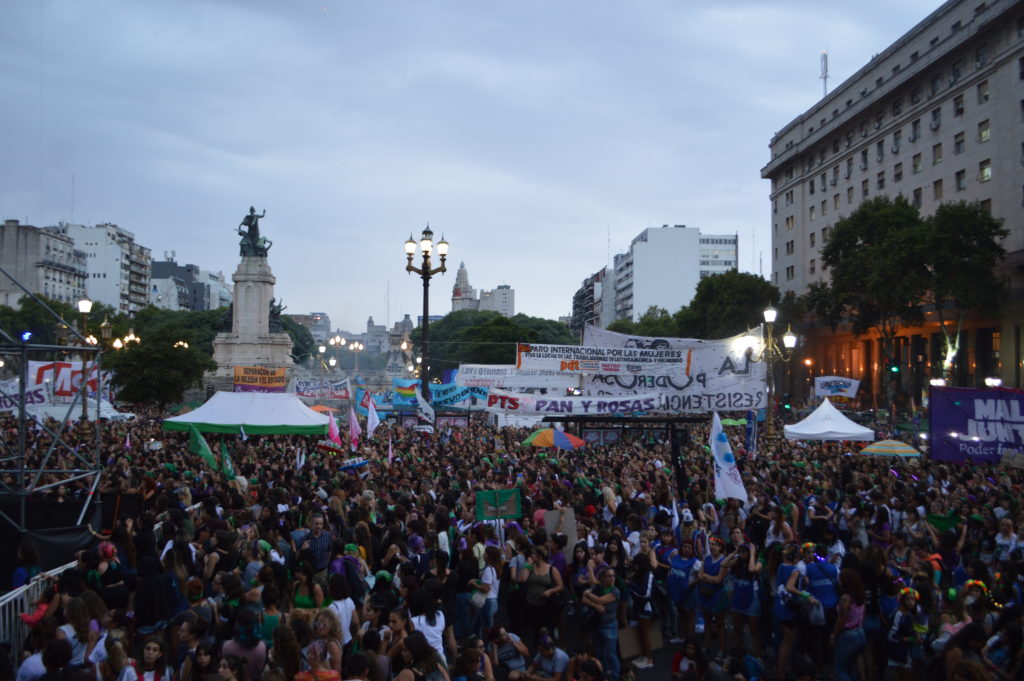
The loudest cry on March 9th this year was the demand for legal abortion. Argentine president Alberto Fernández announced during his speech opening this congressional session that he would present an abortion bill for debate within 10 days. If passed, the bill, which is expected to be presented to congress later this week, would make Argentina the second country in the Southern Cone to broadly legalize abortion, after Uruguay.
Argentine’s congress debated legalizing abortion for the first time in 2018. That bill would have made the procedure legal for any reason within the first 14 weeks of pregnancy. It was passed in the lower house, but defeated in the senate. “It’s a debt [they have] with us, to decide about our bodies,” Lucila Quieto of the Ni Una Menos anti-gender violence movement told Toward Freedom as she marched.
Quieto clutched one end of a long, green banner reading: “We want each other alive, free, and free from debt,” a twist on the usual “We want each other alive” [Vivas nos queremos] slogan. The updated slogan points at another of Argentine feminists’ major points of protest: debt and economic crisis hit women, girls and those with dissident gender identities the hardest. “We get into debt to pay for medicine, things for our children, food,” Quieto said. “It’s a debt that Macri’s fascist government got into. The people are paying it, especially women.”
Argentina is currently facing over $300 billion in external debt, including $44 billion owed to the IMF. In a country where recession and unemployment are already hitting hard, many fear that paying the debts in full and on time would push millions deep into poverty, especially women with caring responsibilities.
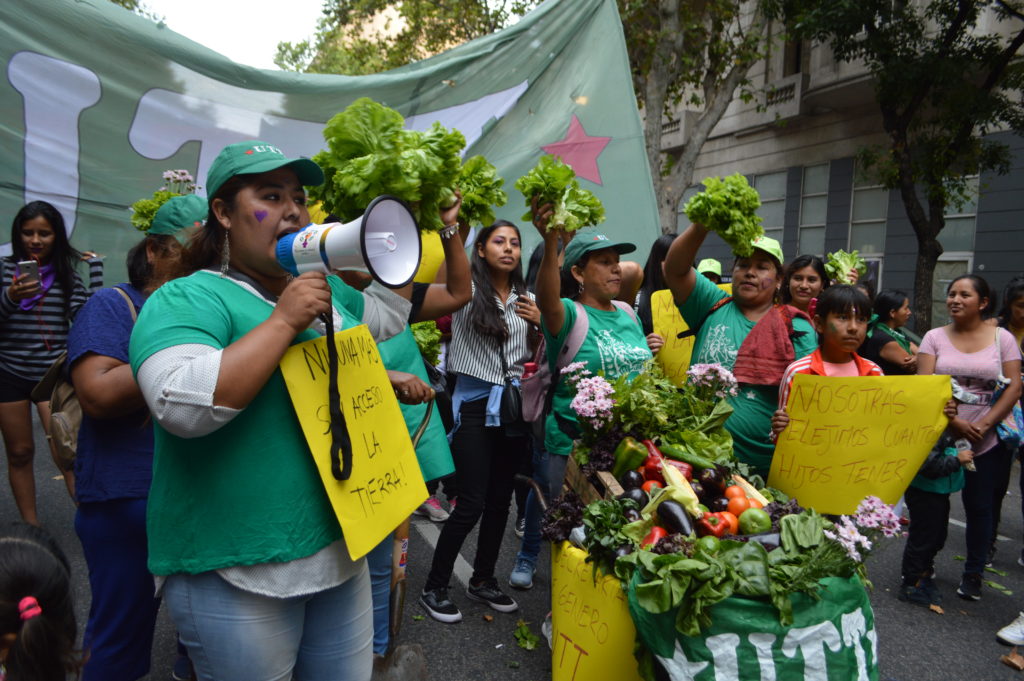
As Fernández’ government looks to extractivism and industrial agriculture to bring in the export earnings it needs to balance Argentina’s books, the demands of ecofeminism come to the fore. Zulma Molloja of the Union of Workers of the Earth, a family and small-scale agricultors’ union, marched Monday to demand better conditions for rural women.
She and her companions waved fresh, green lettuce, and pushed a wheelbarrow almost overflowing with eggplant, lettuce and squash. Bringing produce to the march is a way of making their work visible, she explained. “We’re hidden in the countryside,” Molloja said. “That’s why we come out and show people what we produce, what we bring to the table.”
Molloja explained that women agricultural workers are often mistreated by men at work, while also being exposed to toxic agricultural chemicals. Most have to rent the land they work on, depriving them of stability and control. The majority of her colleagues are from Bolivia, and many face discrimination and anti-Indigenous racism. They marched to demand better homes, roads and schools in the countryside, and to push for authorities to take their reports of male violence seriously. “We do agroecology and we don’t want to play with poison anymore,” she said.
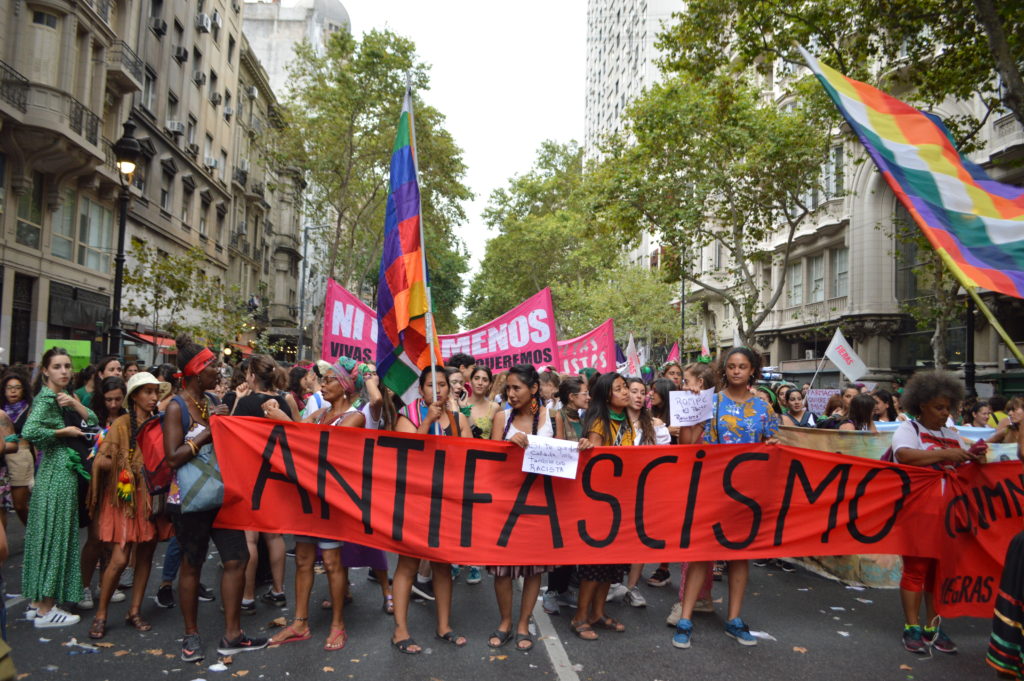
The demand for feminism that includes women of color was loud during the march. It came from a range of contingents, from Indigenous women marching with wiphala flags to the Argentines of African descent, who demanded healthcare that reflects the needs of Black women during the final speeches.
The Trans, Transvestite and Non-Binary Assembly marched to demand a rights for trans, transvestite and non-binary people. At the top of their list is an end to hormone shortages.
“This situation risks the physical and mental health of many of our companions and adds to other rights violations which affect us as a collective,” read a flyer handed out by members of the Assembly. The Assembly is also demanding inclusion in the workplace, recognition of dissident gender identities, and an end to trans-exclusive biological violence.
Tania Dominguez, who struck with the assembly, said she felt optimistic. “Things have been achieved not because of the State, but because of the struggle here in the streets,” she said. Popular power is palpable in Argentina, and yesterday’s action was massive.
From the demand for legal abortion to the discussion of gender identities, many of Argentina’s feminist demands are bound up with the campaign for high-quality, integral sexual education (ESI) in schools. Campaigners hope that good sex education would mean fewer unwanted pregnancies, improve gender relations and help combat sexism from an early age.
But although Argentina has had an ESI law since 2006, teachers are still not trained to give sex education, according to Alba Gullermo, a doctor active with sex education collective DESIdir. “Until a few years ago, it was a very biological concept,” she said. “Integrality includes the gender perspective, different ways of perceiving yourself and your sexual and emotional relations and connections. Not just genitals,” she said.
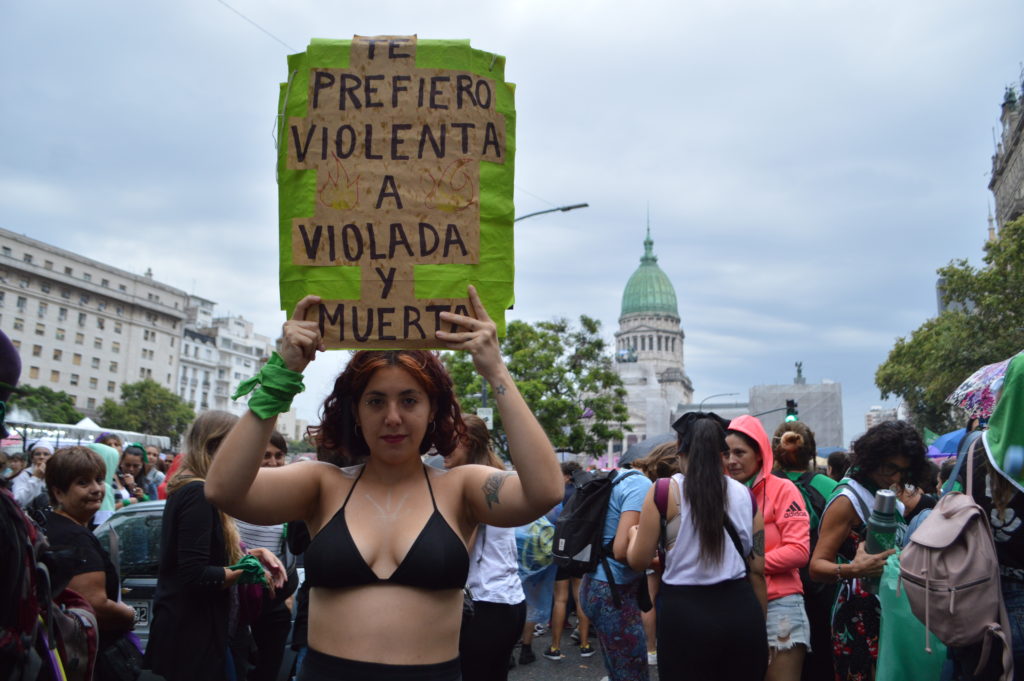
Sex education can be vital in stopping child sex abuse, too, according to María Belén Chacón of anti-child sex abuse collective Yo Sí te Creo (Yes, I believe you). “Because of ESI, there are loads of kids aged seven or eight coming out and saying, ‘My uncle did this, my dad did that,’ because they can talk about it,” she said.
Several campaigners pointed to sex education as a way of combating toxic masculinity. The topic has been in the news in Argentina after the killing of Fernando Báez Sosa, an 18-year-old who was kicked to death by a rugby team outside a nightclub in January. Fernando’s death shocked Argentine society and has prompted a debate about masculinity in sport.
The clouds finally burst as the march reached congress, but the multitude of marchers barely even seemed to notice. From the railings skirting the national congress building hang a patchwork of banners representing feminist collectives, social movements and unions. Marchers were so densely packed that the activists on stage had to call on groups to lower their banners so the women behind them could see. Here and there, the crowd was punctuated by groups of women in fluorescent witches’ hats, street drummers, and circus troupes twirling hula hoops.
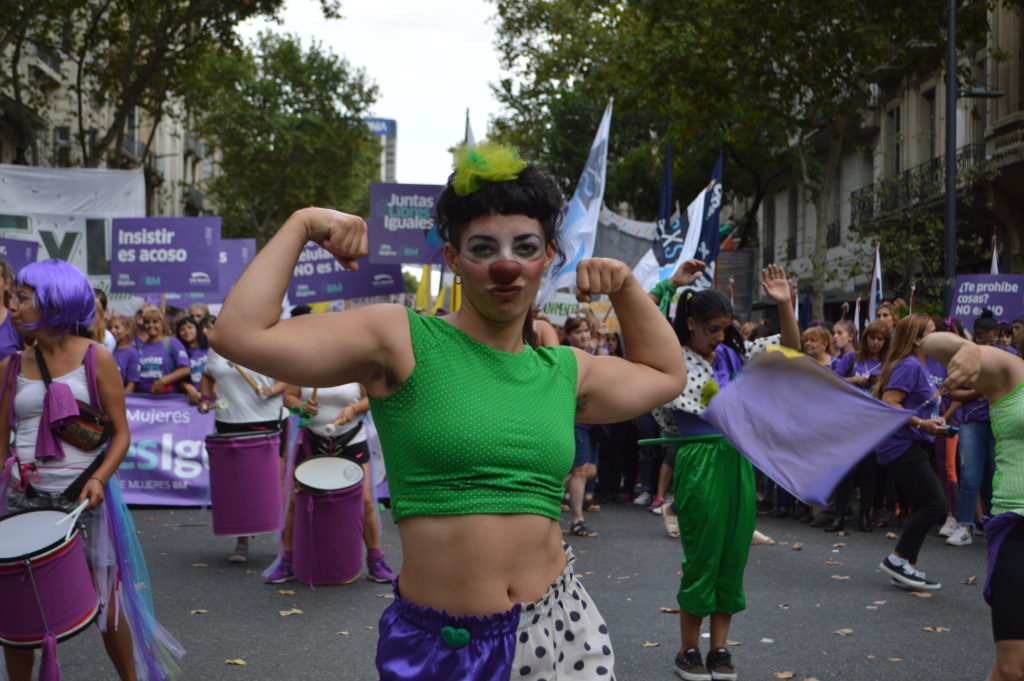
The speeches to close off yesterday’s historic IWD action in Buenos Aires started with a declaration of solidarity with Chilean feminists, who have led a revolution for women’s rights in the neighbouring country since October 2019. They have also faced violent state repression of their actions.
The closing address was given by Nora Cortiñas, of the Mothers of Plaza de Mayo, a group active in searching for the disappeared in Argentina since the 1970s. Her speech, which touched on virtually all the major demands of the day, served as a reminder that gender and women’s rights are central to all of Argentina’s social struggles, and that Argentine women will carry the torch until the change they desire takes hold.
Author bio:
Amy Booth is a journalist covering human rights, politics and society in Argentina and Bolivia. She is studying a masters in Political and Social Theory at the University of Buenos Aires.
